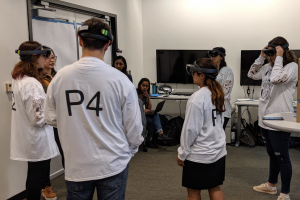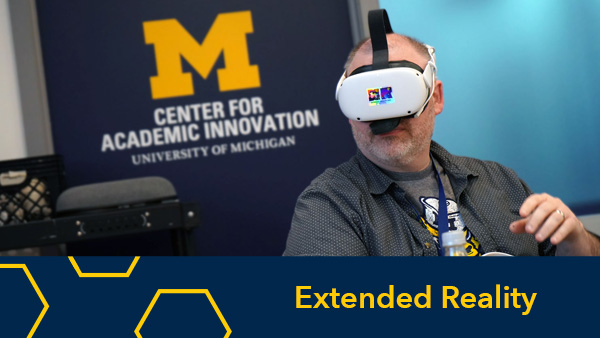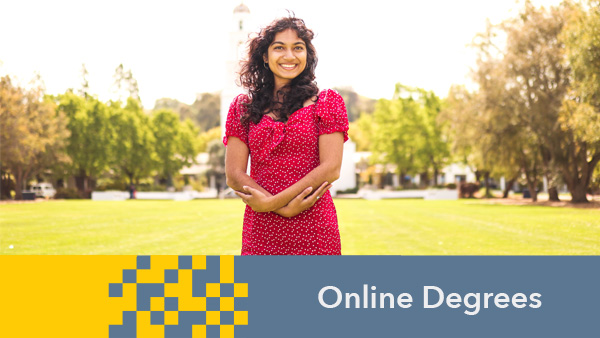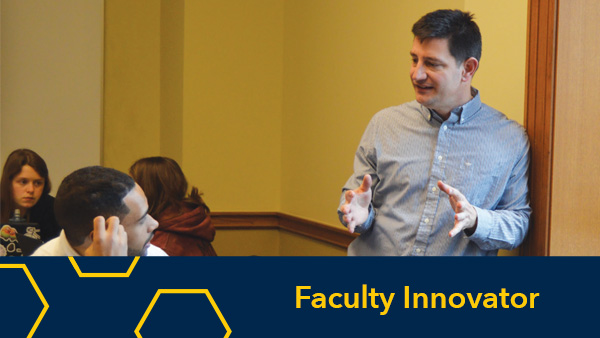Jeremy Nelson, Director of XR Initiative

On May 28, the XR Initiative brought together a group of faculty and staff from the University of Michigan and institutions across the globe to explore how Extended Reality (XR) could be used to deliver hybrid teaching and learning. We heard from leading faculty at U-M about their work using XR for teaching and broke out into workgroups to explore unique areas:
- Labs
- Design Studios and Performance/Exhibition
- Seminar/Critical Class Interaction
- Clinical Practice Based
More than 150 people attended the four-hour symposium and shared learning goals and objectives for their areas of focus and discussed equity and accessibility for students and faculty to use and teach with XR. It was a highly engaging symposium with many great ideas and exciting next steps. We plan to hold additional sessions this summer and fall for an in-depth exploration about how to build courses with these technologies and how faculty and instructors can get started.
Below, you can find all the information made available at the symposium including introductory remarks, faculty presentations and breakout group materials.
I kicked off the Symposium with an overview of the day and an introduction to the XR Initiative.
Faculty Presentations
We heard from seven faculty from six schools about the groundbreaking work they have been doing in XR over the past few years. Each speaker spoke for between 5 and 10 minutes. The video is embedded below and their remarks begin at the time indicated in parentheses.
- Michael Nebeling, talked about his work with Interaction Design in XR with the School of Information. (1:45-8:18)
- Sara Blair talked about her work in the humanities exploring XR and her course “Novels and Virtual Realities.” (8:19-18:07)
- Michelle Aebersold discussed her work with VR clinical simulations and XR training for nurses and medical professionals. (18:15-27:02)
- Joanna Millunchick discussed her work in the college of engineering regarding VR crystal structures and XR funded projects across the college. (27:03-34:12)
- Anil Çamci from the School of Music, Theater, and Dance discussed his course, Immersive Media, to express creativity and performance in XR. (34:28-39:38)
- Lisa Nakamura and John (Jan) Stewart discussed DE&I in the XR classroom and some of the technical barriers for large courses. (39:39-56:13)
- Chris Quintana discussed his work in the School of Education studying XR and how to frame learning experiences and environments. (56:14-1:04:28)
A recording of the presentations can be found and the slide decks are also available.
Breakout Groups
One of the main purposes of this Symposium was to explore how XR could help faculty reimagine their courses and in particular learning goals and objectives with this new technology. Participants were broken out into 4 separate groups moderated by one of the lead faculty presenters to explore their areas of interest. Each breakout group collaborated on a MURAL board and the groups reported back out after the 45 minute sessions.
- Labs – Scientific
- Design Studios and Performance/Exhibition
- Seminar/Critical Class Interaction
- Clinical Practice Based
Each group reported back out on the main points of their breakout sessions and there were a lot of great ideas.
Equity/Accessibility
There was an initial discussion about equity and accessibility for students and faculty around XR hardware and software. Currently, there are only a select number of locations across campus to experience XR.
- Visualization Studio – 1st floor Duderstat Center
- Media Center – 2001 Modern Languages Building (MLB)
- Digital Studies Institute – G333 Mason Hall
There was a good discussion regarding the types of devices and companies that create and support those devices. There was interest in a follow up discussion about this topic and this will be scheduled this summer or early fall.
Next Steps
There was an open discussion about conducting future virtual events this summer to further explore XR technologies and use cases. Please subscribe to our XR newsletter to stay up to date.


